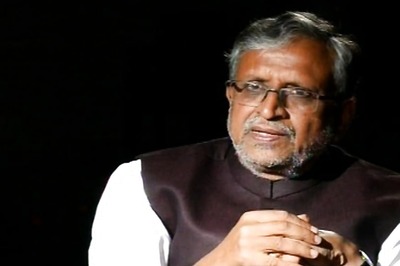
views
New Delhi: Dayamani Barla is one of the most-known tribal activists in the country. For the last 25 years, Barla has been fighting the state and several multinationals over the issues of land rights and the identity and culture of tribals.
Barla has received national and international recognition for her activism and journalism. And now, for the second time in her life, she is about to contest elections. After unsuccessfully contesting from the Khunti Parliamentary seat on an AAP ticket in 2014, Barla is in the poll fray from the Assembly constituency of Khunti on a Jharkhand Vikas Morcha (JVM) ticket.
Khunti has been at the forefront of a civil disobedience movement called Patthargarhi. Civilians here have often clashed with police and paramilitary forces over the past two years. Barla, who is a member of the Munda tribal group, says the breakdown of the order is the fault of the state and central governments.
"Patthargarhi is a tradition of adivasis. Tribals are being forced to part with their land at gun-point. They are being told that if they don't part with their land, that land will be turned into their burial ground. What alternative does a tribal have, but to assert their rights? Rights that give them control over the land under gram sabha and of the natural resources within under the Fifth Schedule,” Barla told News18 during a telephonic conversation.
She added, "I agree that this movement took an ugly turn later on, but it is for the government to think about why it came to this. Why do tribals not want to send their children to government schools? There must be reasons for all this. The government has to answer these questions. Tribals cannot be blamed for this."
Barla also spoke a bit about her own past, about how she got into activism over issues of land rights.
“My life has been full of struggles. I saw people snatch away the piece of land my parents owned. My parents were then forced into bonded labour. When they took away the land from us, our entire family got dispersed. We couldn't afford food. But I did not leave my education. I continued it even when I had to fund it by working as a coolie. I have seen times when I pined for a piece of bread."
It was in 1995 when she formally entered into full-time activism. "The government had announced its plan to build a dam at Koel Karo in Torpa. The dam threatened the existence of 245 villages. Around 2.5 lakh people would have been displaced and 27,000 acres of jungle land would have been submerged. I knew what it meant to lose your land. You lose your culture, your heritage, your identity. It affects your personal life adversely. Since then, I have seen and been a part of many movements against displacement, for tribal rights, in Jharkhand and outside."
Barla received notice from across the world for her fight against a proposed Arcellor Mittal steel plant which would have taken over around 12,000 acres of jungle land, and, many argued, harmed the sensitive ecosystem of the area.
She said things have worsened since the time when she, as a child, saw her family land being snatched away with a forced impression of her father's thumb-print on a piece of paper. Never before, she said, were locals slapped with sedition by the ruling government for voicing their concerns.
"A lot of things have become worse. When I was sent to jail for my activism, I was charged with minor offences and getting bail was not very difficult. Today, the tribals in my district are being charged with sedition for protesting. Can you believe it? This had never happened before. About 15,000 people in Khunti alone are fighting court cases for fighting against displacement, for voicing their opinions. People are more scared than ever of their land being forcibly taken away from them. The threats for a tribal of not parting with his land are much greater."
She said the right to free speech is being curtailed for the first time in a big way.
"Abhivyakti ki aazaadi khatm ho rahi hai (Right to free speech is being curbed). You can't write or speak against the BJP today. See around you, how writers are running away scared. The atmosphere has become much more vitiated. Lynching never happened in these parts. But we just saw an instance of it a few weeks ago. Divisive politics is being played between Christians-non Christians, Muslims-non Muslims, Tribals and non tribals. It is taking us a lot of time to mend these divides."
Barla's journey into politics started with a three-month stint in jail. She said, "I had been thinking about the question of getting into politics for a long time. All parties had offered me tickets. It was in 2012 when I was in jail for three months following a land rights agitation that I seriously considered it. The campaigning for 2014 Lok Sabha elections had started. I thought that we had been winning all fights to save our environment, against displacement, but our elected representatives are frittering away all the gains that we make through hard won fights on the ground."
She said that since lawmakers weren't thinking of "the local people before awarding our natural resources to some millionaire from outside. So we end up going in circles, fighting for our rights, which are squandered away by lawmakers, and fighting for them again. So I decided to go to the very place where laws are made".
The first time she fought polls, the Lok Sabha elections in 2014, she says she was quite unfamiliar with the election process. "The Aam Aadmi Party (AAP) had given those elections tickets to many activists like Medha Patkar and Soni Sori. There was a feeling of optimism. But it was only after the elections that many of us understood the mechanism of fighting elections and how different it is from activism."
In less than 10 days, the state will see the beginning of a five-phased election for the Legislative Assembly.















Comments
0 comment